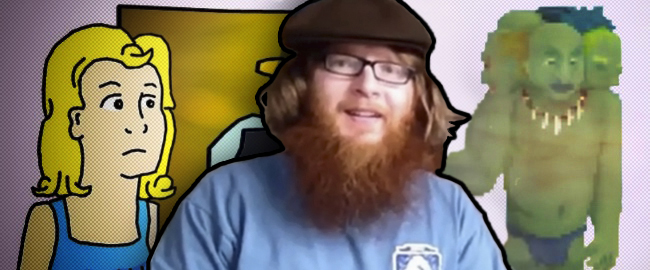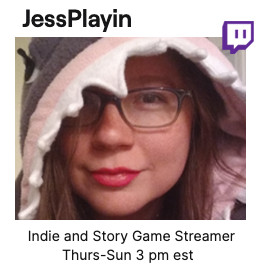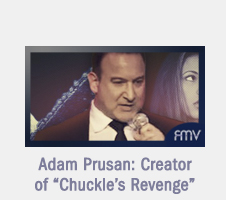


Interview with Paul Franzen
The Creator and Star of A STRANGER COMES CALLING Discusses Indie Game Development and How He Deals With Strangers Ringing His Doorbell.
Paul Franzen's Oh, a Rock Studios has created choose-your-path video games in the past including the visual novelettes My Nigerian Prince and Francy Droo and the Mystery of the Missing Mother-in-Law. Their newest game takes that idea to the realm of live-action full-motion video and deals with the anxiety one feels when an uninvited stranger knocks at the door.
FMV World: Please tell us about your company and how you became a video game developer.
Paul Franzen: Like probably a lot of people my age, I'd wanted to get into game development ever since playing a (bootleg) copy of The Secret of Monkey Island that my dad's friend gave to me on a bunch of floppy disks. (Or, I shouldn't say that I wanted to "make games" so much as I wanted to make Monkey Island, specifically. Monkey Island is the best.)
I was scared off from the field for the longest time because people warned me that programming was all math, and I knew I couldn't math my way out of a paper bag; so I focused more on writing. From high school through about...a couple of years ago, I ran a videogame-review website called GameCola.net; later, I started e-mailing the developers of games I liked to see if they could use an extra writer, and wound up writing and designing Life in the Dorms on Xbox Indie Games.
Around this time I discovered that there are programs like Ren'py and Adventure Game Studio that do all the hard (and for me, uninteresting) (but I only say that because I'm bad at it) parts for you, so you can focus on story and design. Using those, I've been able to release small visual novel games like My Nigerian Prince and Francy Droo under the Oh, a Rock! Studios label. I've also been working on a LucasArts/Sierra-style point-and-click adventure game with my wife called The Beard in the Mirror ![]() for a number of years.
for a number of years.
Oh, a Rock! is me, chiefly. I don't have a staff so much as I have friends that I work on individual games with. For the longest time I was loathe to give it a formal title at all because it's so unstructured, but it didn't seem right to type "Paul Franzen" into the developer field on Steam Greenlight when I'm not the only person building the games.
After glimpsing a sneak peek at "The Beard in the Mirror," I definitely feel a sense of excitement. Not just because it looks awesome, but because it's a game that a couple of decades ago would have been quite an undertaking, even for game studios like LucasArts and Sierra. How do you begin to develop such a game with limited resources? What are the steps in your process?
For The Beard in the Mirror, that's easy — we've spent a decade working on it. (...So far.) When you don't have any real deadlines other than whatever you've self-imposed, and you're working on the game in your spare time as opposed to developing it professionally, it's easy ("easy") to take the time you need to make the game you want to make. It also helps that there's an unbelievable amount of assets freely available out there under a Creative Commons license. I'm pretty sure Kevin MacLeod has unintentionally scored at least half the indie games out there.
But Mirror is atypical for the games we've been releasing; everything else takes less than a year - and sometimes only a matter of months - from "hey, we should make this game" to *crosses fingers and sends review code to Polygon*. The key (for us, at least) is to set tenable goals and keep the scope limited. Know what you can already do, plan a couple of things you DON'T know how to do but would enjoy figuring out, and don't plan anything that would make more than a year or so to create — especially if you're working with other people, because it can cause super-big problems if they get bored before you're finished making the game.
"A Stranger Comes Calling" may seem familiar to fans of interactive movies in terms of its "choose-your-path" play mechanics, but thematically it's much different than anything we've seen before. It's mainly about the anxiety that one feels when someone unexpectedly rings the doorbell. That's it. Not much to base a game on, yet it's engaging, funny, and something many of us can instantly relate to. How did you come up with the idea for this game?
I was working with the sets that were available to me, which were 1) my house, and 2) about three feet outside my house, any further than which a neighbor might've seen me and potentially asked what I was doing and why there were stuffed animals everywhere. I needed a story with limited locations and limited actors, as well, since I didn't know anyone who lived close enough that I'd be able to wrangle into this.
I wouldn't say that I hate talking to people I don't know, but it definitely puts me on edge. When I was younger, before I'd call anyone on the phone, I'd write down what I wanted to say so I wouldn't trip over myself and accidentally tell the dentist that I love them. The concept and story for A Stranger Comes Calling took this social unease to an extreme — when there's someone at the door, and you're not expecting anyone, there's a primal instinct to hide under the table or whatever and hope they just go away. FMV was the perfect medium for this because it afforded me the opportunity to do really dumb and goofy things in front of a camera, and also I didn't have to draw any pixels.
Do you ever answer the door in real life?
In real life, I try to avoid it to the extent that it's socially possible. If I'm expecting a package, and it's the time of day when the mail-carrier usually shows up; I'll answer it; otherwise, I might sidle up to the window and try to catch a peek of whoever's out there. If they're carrying a clipboard or wearing any sort of suit, I sidle right the hell back and hope they didn't see me, lest I get caught up in an uncomfortable conversation about religious beliefs, or worse, my meat supplier. (That last one actually happened. The dude wanted to know who my meat supplier was. I told him we didn't have one; then he asked to talk to my parents. I was 28 at the time.)
...Or, if my wife's home, I just ask her to open the door. Actually forget the rest of the stuff I said; that's what I actually usually do •

A Stranger Comes Calling is available for purchase from Oh, a Rock! Studios.




